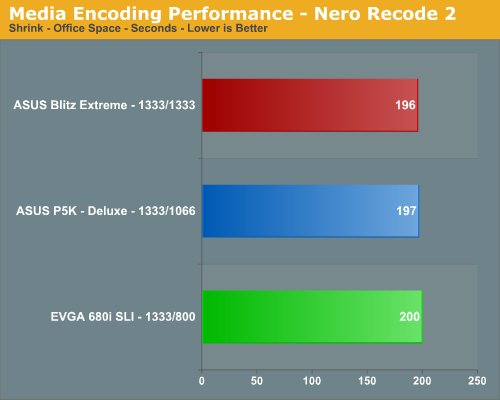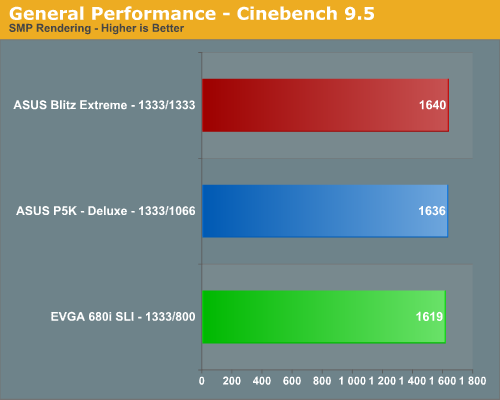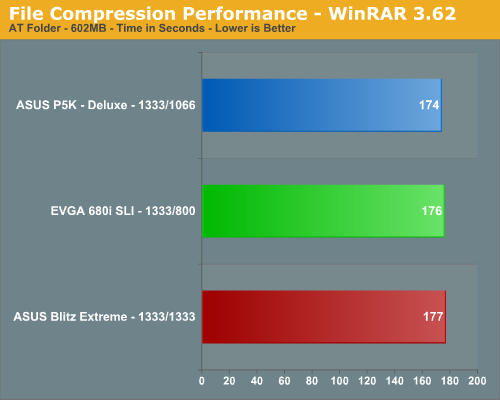NVIDIA 680i SLI: Official 1333MHz FSB CPU Support Arrives
by Gary Key on July 20, 2007 12:01 AM EST- Posted in
- CPUs
Media Encoding Performance:
Our first series of tests is quite easy - we take our original Office Space DVD and use AnyDVD and Nero Recode 2 to copy the full DVD to the hard drive without compression, thus providing an almost exact duplicate of the DVD. We then fired up Nero Recode 2, selected our Office Space copy on the hard drive, and performed a shrink operation to allow the entire movie along with extras to fit on a single 4.5GB DVD disc. We left all options on their defaults except we checked off the advanced analysis option. The scores reported include the full encoding process and is represented in seconds, with lower numbers providing better performance.

The Nero Recode Shrink results show the improved CPU throughput speeds of the Intel P35 boards resulting in a 2% advantage over the EVGA 680i SLI board.
Rendering Performance:
We are using the Cinebench 9.5 benchmark as it tends to heavily stress the CPU subsystem while performing graphics modeling and rendering. Cinebench 9.5 features two different benchmarks with one test utilizing a single core and the second test showcasing the power of multiple cores in rendering the benchmark image. We utilize the standard multiple core benchmark demo and default settings.

Once again, we notice the advantage of an Intel chipset in a CPU throughput test with the P35 placing 1% ahead of the EVGA 680i SLI board. In the grand scheme of things, this difference and the one in our Nero test is actually very minor.
File Compression Performance:
In order to save space on our hard drives and ensure we had another CPU crunching utility, we will be reporting our file compression results with the latest version of WinRAR that fully supports multithreaded operations and should be of particular interest for those users with dual core or multi-processor systems. Our series of file compression tests utilizes WinRAR 3.62 to compress our test folder that contains 444 files, ten subfolders, and 602MB worth of data. All default settings are utilized in WinRAR along with our hard drive being defragmented before each test.

In this test that stresses overall memory latencies and CPU/Memory throughput we see the DDR3 configuration finishing last. The nature of file compression is such that memory is accessed almost constantly in a very random fashion, so page misses requiring additional time as memory banks are swapped is common. The 680i did not perform as bad as we originally thought it would in this test considering its memory speed although latencies are decent.
Our first series of tests is quite easy - we take our original Office Space DVD and use AnyDVD and Nero Recode 2 to copy the full DVD to the hard drive without compression, thus providing an almost exact duplicate of the DVD. We then fired up Nero Recode 2, selected our Office Space copy on the hard drive, and performed a shrink operation to allow the entire movie along with extras to fit on a single 4.5GB DVD disc. We left all options on their defaults except we checked off the advanced analysis option. The scores reported include the full encoding process and is represented in seconds, with lower numbers providing better performance.

The Nero Recode Shrink results show the improved CPU throughput speeds of the Intel P35 boards resulting in a 2% advantage over the EVGA 680i SLI board.
Rendering Performance:
We are using the Cinebench 9.5 benchmark as it tends to heavily stress the CPU subsystem while performing graphics modeling and rendering. Cinebench 9.5 features two different benchmarks with one test utilizing a single core and the second test showcasing the power of multiple cores in rendering the benchmark image. We utilize the standard multiple core benchmark demo and default settings.

Once again, we notice the advantage of an Intel chipset in a CPU throughput test with the P35 placing 1% ahead of the EVGA 680i SLI board. In the grand scheme of things, this difference and the one in our Nero test is actually very minor.
File Compression Performance:
In order to save space on our hard drives and ensure we had another CPU crunching utility, we will be reporting our file compression results with the latest version of WinRAR that fully supports multithreaded operations and should be of particular interest for those users with dual core or multi-processor systems. Our series of file compression tests utilizes WinRAR 3.62 to compress our test folder that contains 444 files, ten subfolders, and 602MB worth of data. All default settings are utilized in WinRAR along with our hard drive being defragmented before each test.

In this test that stresses overall memory latencies and CPU/Memory throughput we see the DDR3 configuration finishing last. The nature of file compression is such that memory is accessed almost constantly in a very random fashion, so page misses requiring additional time as memory banks are swapped is common. The 680i did not perform as bad as we originally thought it would in this test considering its memory speed although latencies are decent.










18 Comments
View All Comments
FireTech - Saturday, July 21, 2007 - link
Seconded.
Actually, it's over four months now. First post in http://forums.anandtech.com/messageview.aspx?catid...">mATX Roundup was on 15/03/07....
No matter, we do have another Intel focussed article to read while we wait for it ;)
DigitalFreak - Friday, July 20, 2007 - link
Good job! Want a cookie?
JKing76 - Friday, July 20, 2007 - link
No thanks, the thrice-promised uATX roundup would be fine.CrystalBay - Friday, July 20, 2007 - link
It must get really boring to keep testing MB's without much more than 2% performance differences.... Parity blows.....poohbear - Friday, July 20, 2007 - link
nice article, but the above was a bit much for a "professional" article. no offense, i like anantech for their technical knowledge not their ability to ramble on w/ half-hearted jokes. do i really need to read all that before understanding all u needed was a P35 board?
Chunga29 - Friday, July 20, 2007 - link
I actually thought the snarky comments at the beginning was the most enjoyable part. All NVIDIA's marketing hype kicking in bragging about their platform, when the reality is that it's nothing really special. The more pressing concern was the next sentence:Okay, so that's just one more reason to stick with XP for me, but seriously are you telling me that NVIDIA's launch Vista drivers were so perfect that no updates are necessary? I'd say their driver teams are probably overworked right now, but regardless if I were looking at Vista that situation wouldn't make me very happy.
BitJunkie - Friday, July 20, 2007 - link
I've had this board and a 7950GX2 card from nvidia since December 2006 with an E6600 plugged in to it. It's been stable at a 1333 FSB with memory running at 1066 since then all be it with slack 5-5-5-15 timings.On the whole it's a fast(ish) and stable system BUT....and it's a BIG but the drivers have been the weak link since I installed Vista in January. Not real change for me in that time, I STILL get BSOD'd regularly, the SLI functionality is borked for the gfx card and up until new BIOS my raid array keept locking up on boot.
Expecting them to deliver the goods for the newer 1333 fsb quad core CPUs is kind of like pissing in to the wind. I so hope amd / ati get their act together soon, this is getting old.
Sunrise089 - Friday, July 20, 2007 - link
Agreed - I can find benchmarks anywhere, and this sort of article (unlike say the memory wall one) doesn't require a lot of technical expertise - so why not liven it up a bit.